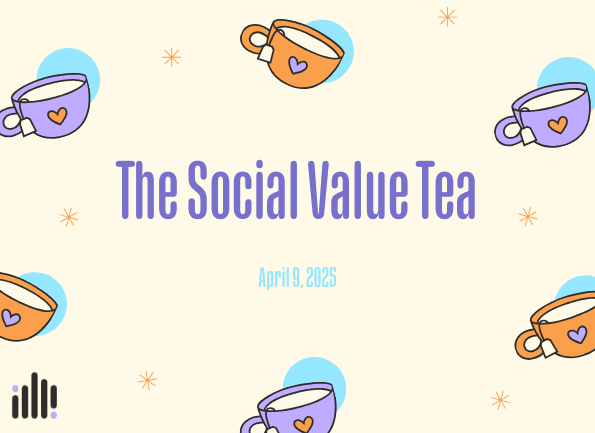What are the seven sins of greenwashing?
If you’ve even so much as touched the topic of social value, you’ll likely be no stranger to the term ‘greenwashing’. As concerns such as ESG and sustainability have risen in prominence and importance, it’s become a common claim to see thrown about. And a very real fear for any business hoping to share their progress towards environmental and social goals.
A 2020 EU survey found that 53% of environmental product claims were vague, misleading, or unfounded
What is greenwashing?
Greenwashing is the act of misleading consumers regarding the environmental practices of a company or the environmental benefits of a product or service. There are more ‘green’ products than ever before, so consumers (rightly) need help identifying those products and services that make misleading environmental claims.
In the past, we’ve broken down some of the ways your organisation could be accidentally guilty of greenwashing in its social value reporting and public-facing communications. But that was just scratching the surface. Greenwashing remains a significant problem and concern for businesses across all industries.
So we wanted to dive a little deeper into the topic with these seven sins that you should avoid.
The seven sins of greenwashing
Back in 2007, TerraChoice published the ‘seven sins of greenwashing’. They compiled some of the most common traps you might fall into – regardless of where you are in your social value or sustainability journey. And despite being over 15 years old, it’s amazing how much they still hold true today.
Misleading people about your sustainability or green credentials isn’t always a conscious choice. And it’s not always as extreme as lying outright. There’s a lot of nuance to this conversation and layers to the problem.
It’s important we continue to unpack this term and improve our own understanding of greenwashing and the part we could be playing in it. Doing so is valuable for many reasons. Firstly, so we can be more conscious and aware of how we (intentionally or unintentionally) contribute to the problem. This way, we’re able to nip bad habits in the bud and avoid being on the receiving end of unwanted attention or backlash. Knowing what you’re up against is half the battle.
Secondly, it means we, as consumers and individuals, can be more wary of the problem and make more informed choices about the businesses we choose to align with and support. So, without further ado, let’s break down the seven sins of greenwashing…
Greenwashing Sin #1: The hidden trade-off
This is where you claim to have ‘solved’ a particular problem. But while the solution you’ve found does solve that specific issue, it also gives rise to a new, separate one.
You might remove all single-use plastics from your organisation’s headquarters and opt for paper alternatives wherever possible. But while you’re reducing your plastic consumption, you’re not reducing your overall waste.
In fact, faced with more ‘sustainable’ paper options, you might see more members of staff using these alternatives, whereas before they brought their own reusable items to avoid using plastic. And this can lead to even more waste than you were producing before you made the switch. So monitor whatever it is you’ve changed to make sure you are having a positive impact.
Greenwashing Sin #2: Irrelevance
These are true, legitimate claims that hold no relevance or importance to consumers. It’s when you shout from the rooftops about cutting out an ingredient that’s banned anyway. Or boast about a reduction in emissions everyone in your industry has had to do to stay compliant.
It’s glorifying the bare minimum. Sharing changes to your ways of working that don’t represent a real, meaningful shift in your business, operations, or core values. Whatever your initiatives are, make sure they’re current, effective, and contribute to a wider shift.
Greenwashing Sin #3: Worshipping false labels
This is a more extreme example of greenwashing. It’s when you feature third-party certifications or labels that don’t actually exist. They’re made up to mislead consumers into believing a brand or product is more ethical than it is.
While it’s extremely unlikely you’re doing this one, do ensure that all accreditations and bodies are legitimate and that you’re working with other great minds.
Greenwashing Sin #4: No proof
This is anything you say or claim without factual evidence or third-party certification. You can say “we’ve reduced our carbon footprint by 30% in the past two years”, or “we’re working closely with local charities to combat homelessness in the community”. These might be 100% accurate, but if you aren’t providing clear receipts about what you’ve achieved and how you’ve achieved it, then it’s just white noise.
What specific switches have you made to reduce your carbon footprint? How many tonnes of carbon have your new solar panels avoided? How many volunteer hours are your staff logging with a local homelessness charity? And how much money have you fundraised for them over the past year?
Be specific. And always support your claims with cold, hard proof.
Greenwashing Sin #5: Vagueness
‘Green’, ‘sustainable’, ‘eco-friendly’, ‘natural’, and ‘ethical’. These terms are at risk of being overused by businesses who want to stand out. The issue is that they’re all surface level. They say nothing at all about what your business is doing or why you’re a more sustainable choice.
“We’re committed to improving our social value.” What does that mean? What does it actually look like? How are you going to generate more social value?
Greenwashing Sin #6: The lesser of two evils
We’re big believers that any change is better than no change at all. But what happens when a change still props up an industry or process that is fundamentally damaging? For example, is using a fuel-efficient sports car really cause for celebration when there are electric alternatives?
There are some product and service categories that are always going to have questionable environmental or social impacts. You might talk about how you’re recycling more plastic – which is good – even though you haven’t explored any alternative materials. Inflating little improvements here and there only seeks to distract consumers from this fact.
Greenwashing Sin #7: Lying
And finally, the biggest one. The core sin that comes to mind when we think about greenwashing. Exactly what it says on the tin, this is making up claims that simply aren’t true. That’s it. Because you will get caught out eventually. Even if you do it accidentally, it’s still not acceptable.
The threat of greenwashing accusations looms over every business’s head – whether you’re 100% legit or not. You can mean everything you say regarding your sustainability and still find yourself targeted if your data isn’t quite up to scratch.
The solution? Aim for complete transparency. Go above and beyond to prove and evidence your claims. Make sure all your data is up to date, reliable, and relevant. Create an open dialogue about every impact you have. If an initiative doesn’t go to plan, share that story, too. Be specific, be honest, and always share anything you have to say.
Impact is a framework-independent platform that allows you to capture and manage all your social value, sustainability, and ESG efforts with ease. It’s never been easier to compile data from your full value chain, complete beneficiary surveys, and generate engaging reports for stakeholders. To find out more, schedule a demo or get in touch with the team on 0161 532 4752.

